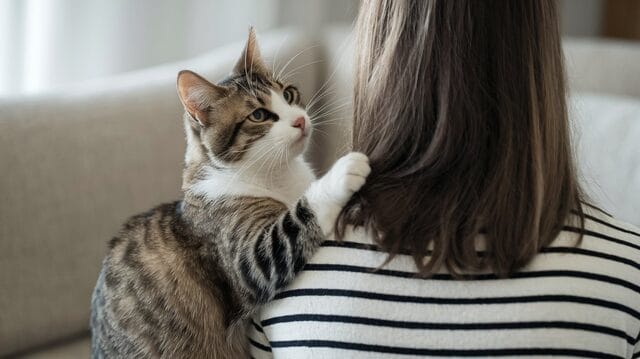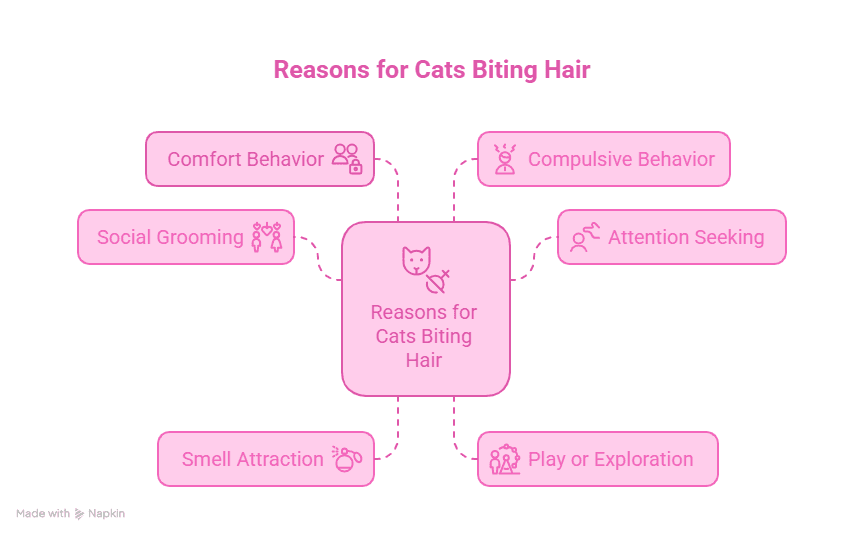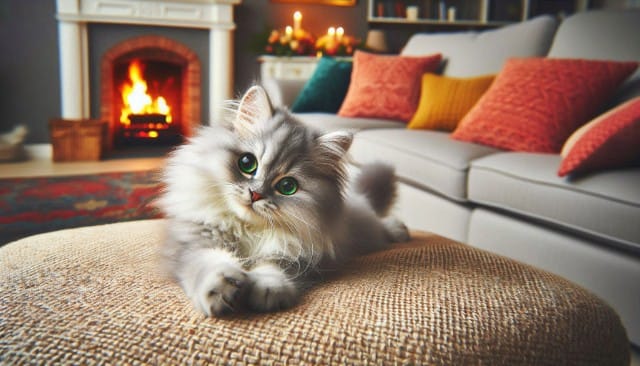
Introduction
You’re lying on the couch, scrolling through your phone. Everything’s peaceful—until suddenly, you feel a tug on your head. It’s not your imagination—it’s your cat. Again. And they’re happily biting or chewing on your hair like it’s their new favorite toy.
It’s adorable, maybe even funny at first, but after the fifth time in a week, you start wondering:
Why does my cat bite my hair?
Is it normal? Is it a sign of affection, stress, or just plain weird cat logic?
The good news? This behavior is more common than you think. The better news? It usually means your cat really likes you.
In this article, we’ll explore the psychology, instinct, and environmental triggers behind hair-biting cats. We’ll also cover when it’s harmless, when it’s not, and how to gently discourage it (if your locks are paying the price).
Is It Normal for Cats to Bite Hair?
Yes—biting or chewing human hair is fairly common, especially among affectionate, bonded cats. While not all cats do it, those that do typically start:
- In moments of closeness
- During rest or grooming routines
- As part of early-morning or nighttime rituals
It may seem odd from a human point of view, but in cat logic, this behavior often mimics social grooming, comfort-seeking, or even play.
Most of the time, it’s not harmful, but it can become irritating, and in rare cases, a sign of stress or compulsive tendencies.
Let’s break down the real reasons your feline might be nibbling on your hair.
Top 6 Reasons Why Cats Bite Your Hair

🧼 1. Social Grooming: You’re Part of Their Family
The most common reason is social grooming, also known as allogrooming. In feline groups, cats groom each other as a way to:
- Bond socially
- Build trust
- Maintain cleanliness in hard-to-reach areas
By grooming you—yes, including biting or licking your hair—your cat may be:
- Including you in their social group
- Showing affection in their own language
- Taking on a “caretaker” role
If your cat gently licks, nibbles, or chews your hair while purring or cuddling, it’s almost always affectionate grooming.
This behavior is especially common in:
- Cats raised in litters (with strong social bonding)
- Cats adopted as kittens and raised closely with humans
- Affectionate or “Velcro” cats
🧠 2. They’re Seeking Attention—And It Works
Let’s be honest—biting your hair gets a reaction.
You flinch, laugh, talk to them, maybe pet them. If you’re busy on a screen or ignoring them, this is their way of saying:
“Hey! I’m here. Pay attention to me.”
Cats are smart. If your cat learns that hair-biting reliably:
- Gets your attention
- Leads to pets or playtime
- Breaks the boredom…
They’ll repeat it. Because it works.
🐾 3. Your Hair Smells (and Tastes) Interesting
Cats experience the world through scent, and your hair is a scent-rich environment. Depending on what you use or where you’ve been, your hair might smell like:
- Coconut oil or floral shampoo
- Your food (think cooking smells)
- Other pets or people
- Nature, grass, or outside air
Some cats are particularly sensitive to scented products. Hair that smells like catnip, mint, or vanilla might be irresistible, especially to scent-driven cats.
And let’s not forget: some cats just like the texture of long hair, especially if it dangles like a toy.
🎮 4. It’s a Form of Play or Exploration
For younger cats and kittens, everything is a toy—including your hair.
Long hair mimics:
- String
- Grass
- Feathers
When it moves, flips, or dangles, it triggers a cat’s natural prey response.
If your cat is:
- Biting your hair while kneading or purring
- Jumping at your ponytail
- Attacking your head while you sleep…
…it’s likely a playful, exploratory behavior, not an aggressive one.
It may also mean your cat needs more interactive playtime or mental stimulation during the day.
😽 5. Comfort or Weaning Behavior (Oral Fixation)
Some cats develop oral habits for soothing purposes, much like thumb-sucking in children. This can include:
- Sucking on blankets
- Licking plastic
- Biting your hair
This is particularly common in cats who:
- Were weaned too early
- Had traumatic or under-socialized kittenhoods
- Display comfort-seeking behaviors during stress
Your hair may serve as a soft, familiar object that reminds them of nursing or being close to their mother.
⚠️ 6. Compulsive Behavior or Anxiety
In rare cases, hair-biting becomes compulsive, especially if it escalates in frequency or intensity.
This might reflect:
- Stress from changes in the home
- Separation anxiety
- Obsessive-compulsive behavior (OCD)
- Boredom or under-stimulation
If your cat:
- Bites your hair obsessively or aggressively
- Refuses to stop despite redirection
- Shows other signs of anxiety (hiding, overgrooming, vocalizing)
…it’s worth checking with your vet or a feline behaviorist.
When Is Hair Biting a Problem?
While most cats bite hair harmlessly and occasionally, here are red flags to watch for:
🚩 Warning Signs:
- Hair ingestion (vomiting hair strands or hairballs)
- Aggressive biting or sudden mood shifts
- Chewing hair off your head or pulling hard
- Persistent biting during sleep or rest
- Sudden onset of behavior in older cats
Hair ingestion can lead to gastrointestinal issues or blockages, especially in cats prone to pica (a disorder involving eating non-food items).
If the behavior seems obsessive, compulsive, or linked to other issues, consult your veterinarian for a health and behavior evaluation.
How to Gently Discourage the Behavior (If Needed)
If hair biting is becoming uncomfortable or disruptive, you can guide your cat toward healthier alternatives, without breaking your bond.
Here’s how:
✅ 1. Use Redirection, Not Punishment
- Gently move your cat’s mouth away from your hair
- Offer a chew toy or soft kicker toy as a substitute
- Reward them when they choose the toy instead
Avoid yelling, spraying water, or pushing your cat. These responses damage trust and can increase anxiety.
✅ 2. Limit Temptation
- Tie your hair up when snuggling or sleeping
- Avoid letting your hair dangle in front of their face
- Use unscented or less “enticing” hair products
✅ 3. Provide Oral Enrichment
Try toys that are safe to bite or chew:
- Dental chew sticks
- Silvervine or catnip kicker toys
- Crinkle or fabric toys
- Frozen lickable treats
These satisfy oral stimulation needs without involving your hair.
✅ 4. Increase Daily Play and Interaction
Cats that bite out of boredom or excess energy benefit from:
- Two daily play sessions (15–20 mins each)
- Puzzle feeders or treat-dispensing toys
- Window perches or bird-watching setups
Interactive play mimics hunting, burns energy, and helps reduce attention-seeking behaviors like hair biting.
✅ 5. Calm Their Environment
If stress or anxiety is a factor:
- Use pheromone diffusers (like Feliway)
- Stick to a consistent routine
- Give them vertical space and hiding spots
- Avoid major changes or loud disruptions
FAQs
Q. Why does my cat bite my hair at night or in the morning?
A. Cats are crepuscular—most active at dawn and dusk. Hair biting during these times may be a way of waking you, seeking affection, or mimicking early-morning grooming behavior.
Q. Is it dangerous if my cat eats my hair?
A. It can be. Hair isn’t digestible and can cause vomiting, constipation, or intestinal blockages. If your cat is ingesting hair frequently, contact your vet.
Q. Why does my kitten bite my hair more than my adult cat?
A. Kittens explore everything with their mouths. They’re also more playful and curious. Most will outgrow this phase, though some retain it as a comfort behavior.
Q. Do some breeds bite more than others?
A. Breeds like Siamese, Oriental Shorthair, and Burmese are known for being affectionate, vocal, and clingy. They may be more prone to behaviors like grooming and hair biting.
Also Read - Why Does My Cat Sit Behind Me? The Real Reasons Behind This Quiet Behavior
Conclusion
So, why does my cat bite my hair?
Because they love you, because they’re curious, because they’re bored… or because it smells like your coconut shampoo.
What seems like a strange or annoying habit is usually a combination of affection, grooming instinct, comfort-seeking, and attention-getting behavior. Most of the time, it’s harmless and even sweet.
That said, you don’t have to live with hair-tug wake-up calls forever. With gentle redirection, enrichment, and a bit of consistency, you can help your cat express their love in ways that don’t involve biting your bangs.
Because let’s face it—feline affection is weird sometimes… and wonderfully sincere.




